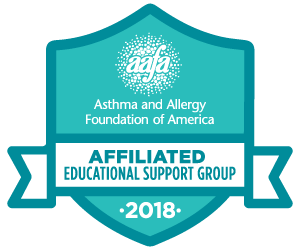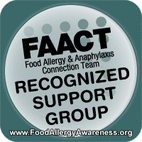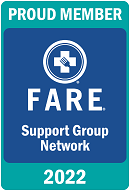 Imagine that you are dining out with family or friends and your throat starts to itch and feel tight. Your lips, tongue, and throat begin to swell, and you start coughing. It gets difficult to breathe. You feel lightheaded and dizzy. You have no idea what is happening. What do you do? After learning you reacted to a food, you are left in disbelief…but I thought only kids had food allergies?? Food Allergy Research & Education (FARE) shares that approximately 15 million Americans are diagnosed with food allergies, 9 million-or 4%- being over the age of 18. However, according to a recent study, almost 11% of adults in the United States have been diagnosed with food allergies. This number has doubled in the last four years.(1) Food allergies, a true medical condition, develop when the immune system “overreacts to a harmless food protein.”(2) In children, we usually see reactions as parents introduce new foods into their diets. But, according to Dr. Paul Bryce, adults are “losing tolerance to foods they’ve already been able to be exposed to and eat. That may be an important difference in understanding how food allergy develops – rather than how tolerance is not occurring in children.”(3) Determining what triggers this loss of tolerance seems very complicated, and more research is being done to try to answer that question. Recent studies show that shellfish, which includes shrimp, is the leading adult allergen. The other most common triggers are tree nuts, followed by fish, soy, and peanut. But, reactions to all "Top 8"allergens-peanuts, tree nuts, wheat, soy, eggs, milk, fish, shellfish-have been seen in adults. Last month, I wanted to delve deeper into adult onset allergies in our local food allergy community. I interviewed eight women with adult-onset food allergies, diagnosed between the ages of 22 and 50. They had a wide range of the Top 8 allergens plus others, like white potatoes and cayenne pepper. When asked how they knew they had an allergy, Stephanie recognized the signs of itchiness, flushing, and tongue swelling because her children have food allergies. Shannon experienced chronic gastrointestinal illness. Several of the women had itchiness or hoarseness in their mouths/throats and felt like their throat was closing. Elizabeth passed out and suffered severe itching. Katherine’s eczema worsened along with constant stomach pain. Becky had random hives and headaches. Taking precautions is a part of life with food allergies. Six of the eight women have been prescribed epinephrine auto-injectors to use in case of anaphylaxis. They all carry antihistamines as part of their action plans. Of course, they all read ingredient labels. They admit that managing food allergies is life changing. Diane sums up what it is like to live with them, “I have to explain to people why I can’t eat the foods I’m allergic to. My peanut allergy is so bad I can’t be close to anyone eating them. Probably the worst thing is to know I can never just eat what I love.” Most of the women mentioned the challenges they face, especially when dining out. As Becky explained, “I do feel guilty when I must inform someone that I have an allergy to a food they’ve provided. It’s a rush of emotion, and I try to use that empathy to teach others instead of feeling bad about myself or the situation.” Diane added that servers often don’t realize the severity of her allergies and sometimes even scoff at her. Katherine, who suffers from multiple food allergies, shares that she sometimes just doesn’t eat out at all. All of the women interviewed stated their families are very supportive and willing to go that extra mile to keep them safe. Many of them have other family member with food allergies, so this experience is not totally new. They also find support in FAAM and online communities. When asked what positive take-aways they’ve learned from having adult-onset food allergies, their answers included patience, understanding, assertiveness, kindness, true friends and family, listening to their body, being mindful of what they eat, and awareness. Several of the women also thought that their diagnosis gives them the voice and platform to educate others about food allergies. Their top tips for managing food allergies include:
Post written by: Jennifer Dodrill About the Author: Jennifer Dodrill is a "retired” Navy wife, mom to 5 amazing kids and a son-in-law, and Grandma to two beautiful granddaughters. She homeschools her youngest daughter and loves to talk about homeschooling & curriculum. We are pleased to have Jennifer and family as members of FAAM and appreciate Jennifer's hard work as a volunteer.
1 Comment
Leave a Reply. |
Food for Thought is the blog for the Food Allergy Alliance of the Mid-South. FAAM's mission is to provide food allergy support, education, advocacy, fellowship & fun for Memphis, TN and surrounding areas.
Archives
August 2023
Categories
All
Terms of Use Disclaimer:
By using this site, you are agreeing to the terms of use stated. If you do not agree with these terms, please do not use this site. The content on this web site and any information presented by FAAM is for informational purposes only and NOT a substitute for medical advice, diagnosis or treatment. The authors are not offering individual medical advice; this material is for reference only. A physician or other qualifying medical professional should always be consulted for medical advice/diagnosis. The authors of this web site; anyone associated with FAAM as members, advocates, leaders, or advisors; Friends of FAAM and/or anyone involved with the production of this web site are not responsible, and do not assume responsibility for any loss, damage, injury, illness, death, or other negative impact that may occur after reading and using the information on this web site. If you have a medical emergency, call 911 immediately and follow up with a physician. |
Providing support, education, advocacy, & fellowship for the food allergy community of Memphis, TN and surrounding areas
P.O. Box 342907 | Memphis, Tennessee 38184-2907 | (901) 300-0790 | Email FAAM
FAAM is a 501(c)(3) nonprofit organization. Copyright © 2015-2024, Food Allergy Alliance of the MidSouth, All rights reserved.
FAAM is a 501(c)(3) nonprofit organization. Copyright © 2015-2024, Food Allergy Alliance of the MidSouth, All rights reserved.



